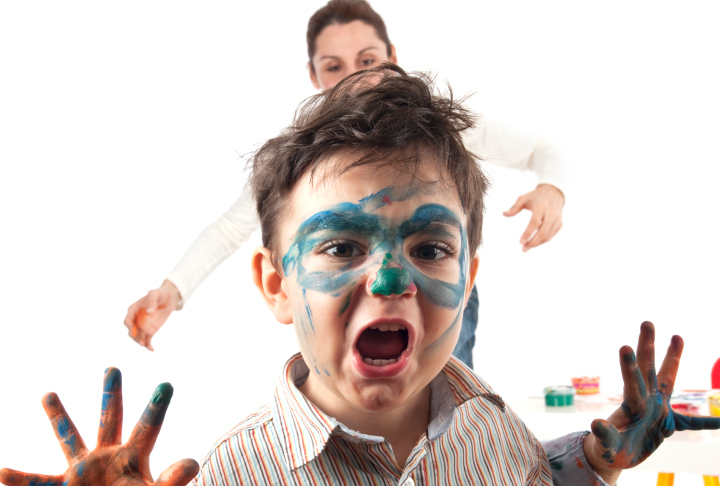
My third child had just been born and I was totally overwhelmed. It was summer. This meant long days. I had three kids, ages 4 and under, at home with me all day and night with little to no help. My house shifted from being relatively happy and peaceful to a complete chaotic mess overnight.
My middle child, age 2 at the time, had the most difficult time with the transition. He resisted getting dressed, taking naps, and getting into the car. Everything became a battle. Eventually I reached my breaking point.
I started talking about the chaos with friends and family. Everywhere I turned, I received similar advice: You need to tighten things up, you need to be firm, you need to crack the whip.
I had received a bachelors degree in psychology only three years earlier. I was familiar with the work of Pavlov and Skinner. I decided that it was time I give behaviorism a shot. I thought that I would be able to discipline by strategically administering that which brings pleasure for positive behavior and that which brings discomfort for negative behavior. Sticker charts and time-outs would be my tools of choice.
I went to the store and filled my basket with stickers and construction paper. At home, I drew up a perfect sticker chart and taped it to my refrigerator. I cleary explained to my son the behavior I expected to see and made a chart with pictures to illustrate the plan. For positive behavior (i.e. getting dressed without a tantrum) he would get a sticker. For poor behavior (i.e. pushing), he would sit in time out for 2 minutes. Done.
Did it work?
No.
In fact, as the weeks and months went by his behavior got worse. I thought I was not being consistent enough. Or, maybe I had to make the consequences more severe.
We ended up in a terrible downward spiral. He acted out. I administered time outs. Then he acted out even more. But I kept it up. I thought that if I stayed the course and remained firm that one of these days he would get it.
I believed at some point he would say to himself, “Oh, I see! When I act out, mom puts me in time out. I do not like being in time out. Therefore, will never act out again.”
This – never – happened. Our relationship was slowly eroding but I did not see it at the time.
Over a year had passed. I read a book called Unconditional Parenting written by Alfie Kohn. In this book, Kohn slams popular discipline techniques like time outs and sticker charts. I was intrigued.
Kohn argues that punishments (including punitive time outs) and rewards teach children that our love is conditional. This approach shows children that they will be treated with kindness and respect only when they follow our rules, remain under our control, and become perfectly compliant.
The outcome of this type of autocratic parenting may include raising children that:
Feel disconnected to their parents
Are less likely to want to please their parents
Become less likely to go to their parents when they have a real problem
Are more likely to lie to avoid punishment
Will only perform a task if there is something in it for them (i.e. reward)
Behave well around authority figures but act out when their backs are turned
Whoa. Talk about a paradigm shift. I thought I was being a responsible parent instilling discipline.
One of the most compelling parts of Kohn’s book is the big-picture piece on motivation. Many parents want their children to do well because doing well brings personal satisfaction to their children’s lives or because it is morally right to do well. Among the parents I dialouge with, we would prefer that our children make the right choices in life because the children value “doing well” and not because they will get a treat for doing so or be made to suffer if they don’t.
So, how do we get kids to do well without rewards and punishments? The answer: strengthen relationships, teach communication tools and skills, model the behavior you want to see, coach them through challenging times, educate them on appropriate behavior, and provide loving guidance when they make mistakes. To learn more, you may want to check out Susie Walton's Joy of Parenting class which offers numerous practical tips and tools for disciplining without reward and punishments.
Back to what happened with my son. To use Kohn’s terminology, we began to work with our son, rather than do things to our son.
With our new mindset, things began to transform. There were no magic bullets or quick fixes. But we are in a very drastically different place today than we were three years ago. My son’s kindergarten teacher last year described him a peacekeeper and one who likes to make certain everything is fair for all.
Children will do better, when they feel better.
Traditional discipline techniques are designed to make a child suffer - and feel bad about himself - in order to teach a lesson. Positive and mindful parents focus less on control and focus more on educating while creating respectful relationships.
I still hold limits and maintain boundaries. But the approach is no longer it-is-my-way-or-the-highway.
I am not a perfect parent. From time to time I yell or reward and punish. I use these strategies when I am too tired, or too busy, to handle parenting consciously. But these behaviors of mine are the exception and not the rule. I don’t strive to parent this way nor do I beat myself up when I go there, at least not for very long.
My kids are not perfect either. They fight, meltdown, get wild, and have their moments too. Yet, they go into the world every school morning and are kind, respectful, happy, responsible, and well-behaved most of the time.
I learned some great lessons after spending a year or so trying to control my children. Although using rewards and punishments may sometimes work in the short run, they come at a cost. Rewards and punishments weaken the relationships we are trying to build with our children.
My work is to be respectful, compassionate, and confident no matter what anyone else is doing. My work is to continue striving for my own self-discipline. Children are always watching what you do and they will remember who you are.



























